Listen to the 404 Media Podcast
This article was produced with support from WIRED. This reporting was also the product of dozens of public records requests.
📄
This article was primarily reported using public records requests. We are making it available to all readers as a public service. FOIA reporting can be expensive, please consider subscribing to 404 Media to support this work. Or send us a one time donation via our tip jar here.
American police departments near the United States-Mexico border are paying hundreds of thousands of dollars for an unproven and secretive technology that uses AI-generated online personas designed to interact with and collect intelligence on “college protesters,” “radicalized” political activists, and suspected drug and human traffickers, according to internal documents, contracts, and communications 404 Media obtained via public records requests.
Massive Blue, the New York-based company that is selling police departments this technology, calls its product Overwatch, which it markets as an “AI-powered force multiplier for public safety” that “deploys lifelike virtual agents, which infiltrate and engage criminal networks across various channels.” According to a presentation obtained by 404 Media, Massive Blue is offering cops these virtual personas that can be deployed across the internet with the express purpose of interacting with suspects over text messages and social media.
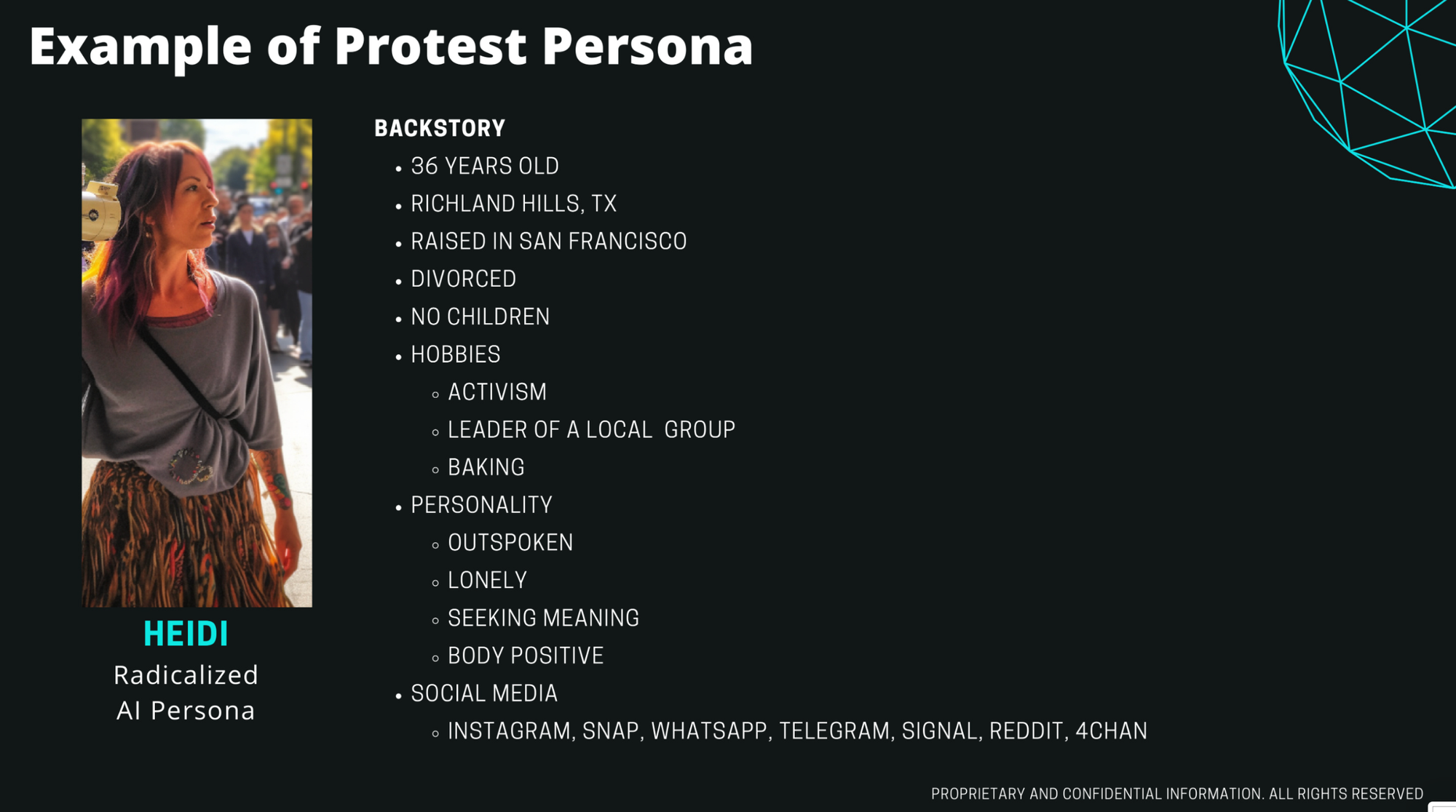
A screenshot from a Massive Blue presentation to the Texas Department of Public Safety, obtained using a public records request.
Massive Blue lists “border security,” “school safety,” and stopping “human trafficking” among Overwatch’s use cases. The technology—which as of last summer had not led to any known arrests—demonstrates the types of social media monitoring and undercover tools private companies are pitching to police and border agents. Concerns about tools like Massive Blue have taken on new urgency considering that the Trump administration has revoked the visas of hundreds of students, many of whom have protested against Israel’s war in Gaza.
404 Media obtained a presentation showing some of these AI characters. These include a “radicalized AI” “protest persona,” which poses as a 36-year-old divorced woman who is lonely, has no children, is interested in baking, activism, and “body positivity.” Another AI persona in the presentation is described as a “‘Honeypot’ AI Persona.” Her backstory says she’s a 25-year-old from Dearborn, Michigan whose parents emigrated from Yemen, and who speaks the Sanaani dialect of Arabic. The presentation also says she uses various social media apps, that she’s on Telegram and Signal, and that she has US and international SMS capabilities. Other personas are a 14 year-old boy “child trafficking AI persona,” an “AI pimp persona,” “college protestor” [sic], “external recruiter for protests,” “escorts,” and “juveniles.
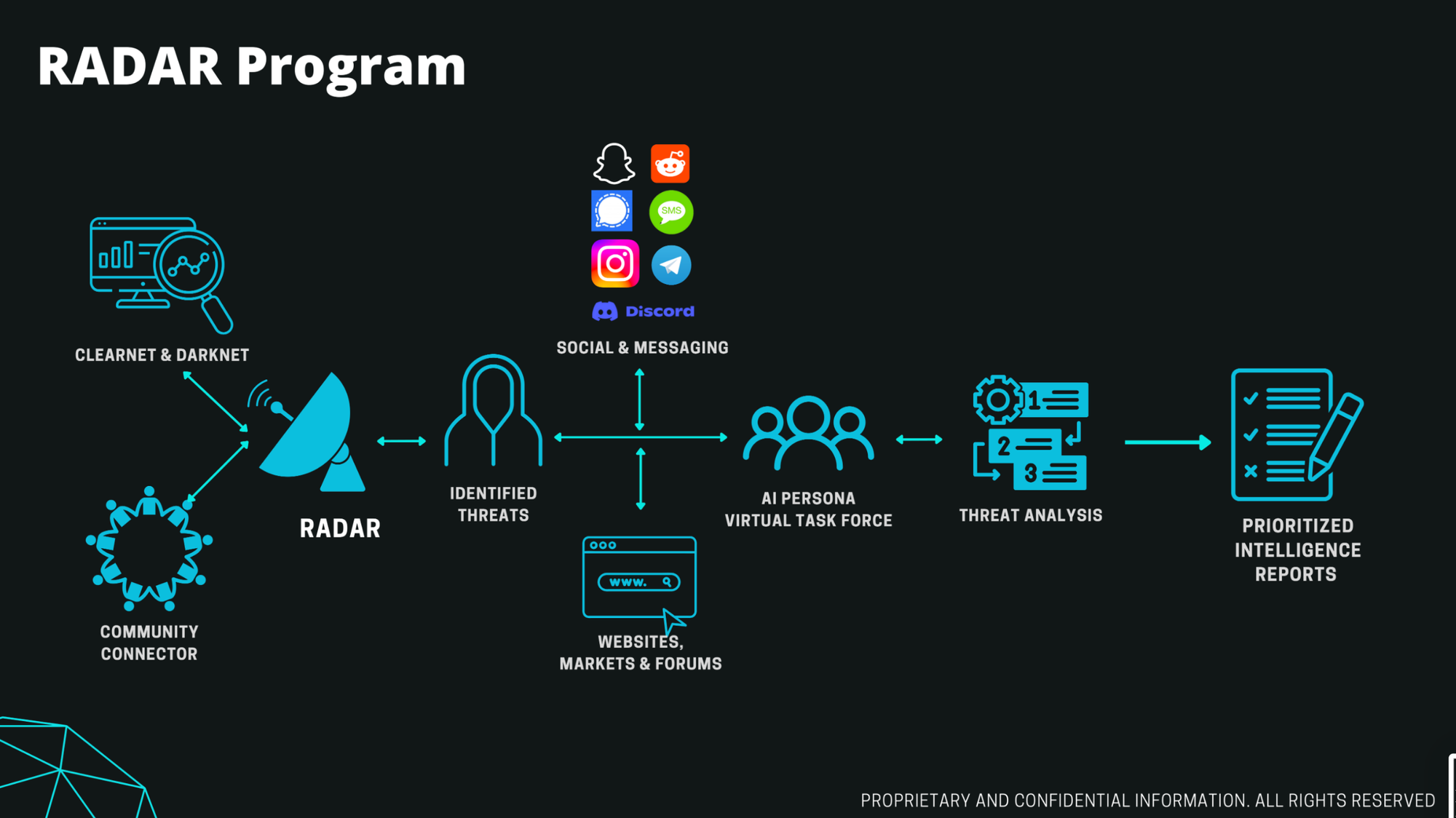
An overview of how Massive Blue’s products work presented to the Texas Department of Public Safety, obtained using a public records request.
Our reporting shows that cops are paying a company to help them deploy AI-powered bots across social media and the internet to talk to people they suspect are anything from violent sex criminals all the way to vaguely defined “protestors” with the hopes of generating evidence that can be used against them.
“This idea of having an AI pretending to be somebody, a youth looking for pedophiles to talk online, or somebody who is a fake terrorist, is an idea that goes back a long time,” Dave Maass, who studies border surveillance technologies for the Electronic Frontier Foundation, told 404 Media. “The problem with all these things is that these are ill-defined problems. What problem are they actually trying to solve? One version of the AI persona is an escort. I’m not concerned about escorts. I’m not concerned about college protesters. So like, what is it effective at, violating protesters’ First Amendment rights?”
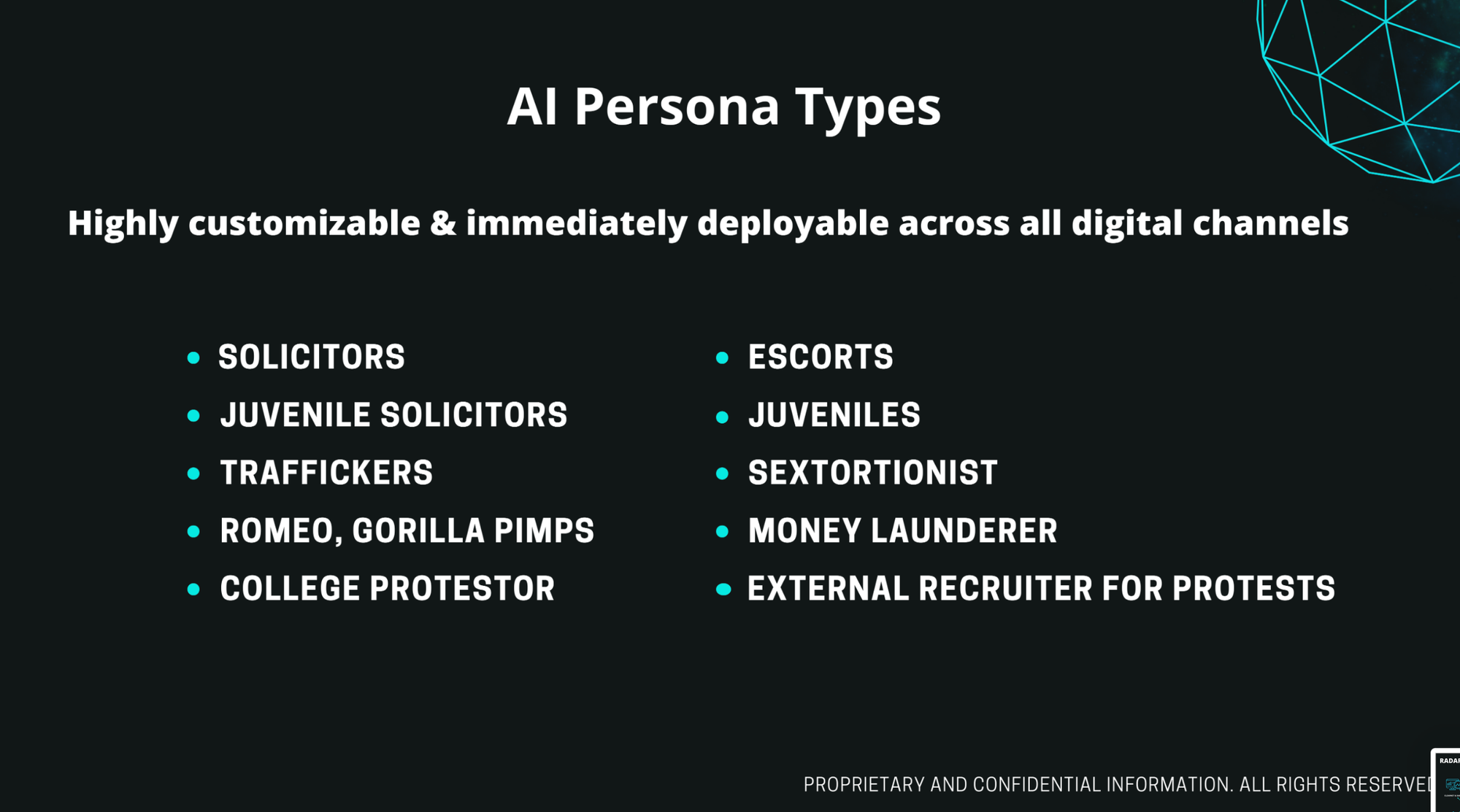
The types of personas Massive Blue tells police that it can make
Massive Blue has signed a 360,000 contract with Pinal County, Arizona, which is between Tucson and Phoenix. The county is paying for the contract with an [anti-human trafficking grant](https://www.azdps.gov/grants?ref=404media.co) from the Arizona Department of Public Safety. A Pinal County [purchasing division report](https://pinal.novusagenda.com/AgendaPublic/CoverSheet.aspx?ItemID=27452&MeetingID=2151&ref=404media.co) states that it has bought “24/7 monitoring of numerous web and social media platforms” and “development, deployment, monitoring, and reporting on a virtual task force of up to 50 AI personas across 3 investigative categories.” Yuma County, meanwhile, signed a 10,000 contract to try Massive Blue in 2023 but did not renew the contract. A spokesperson for the Yuma County Sheriff’s Office told 404 Media “it did not meet our needs.”
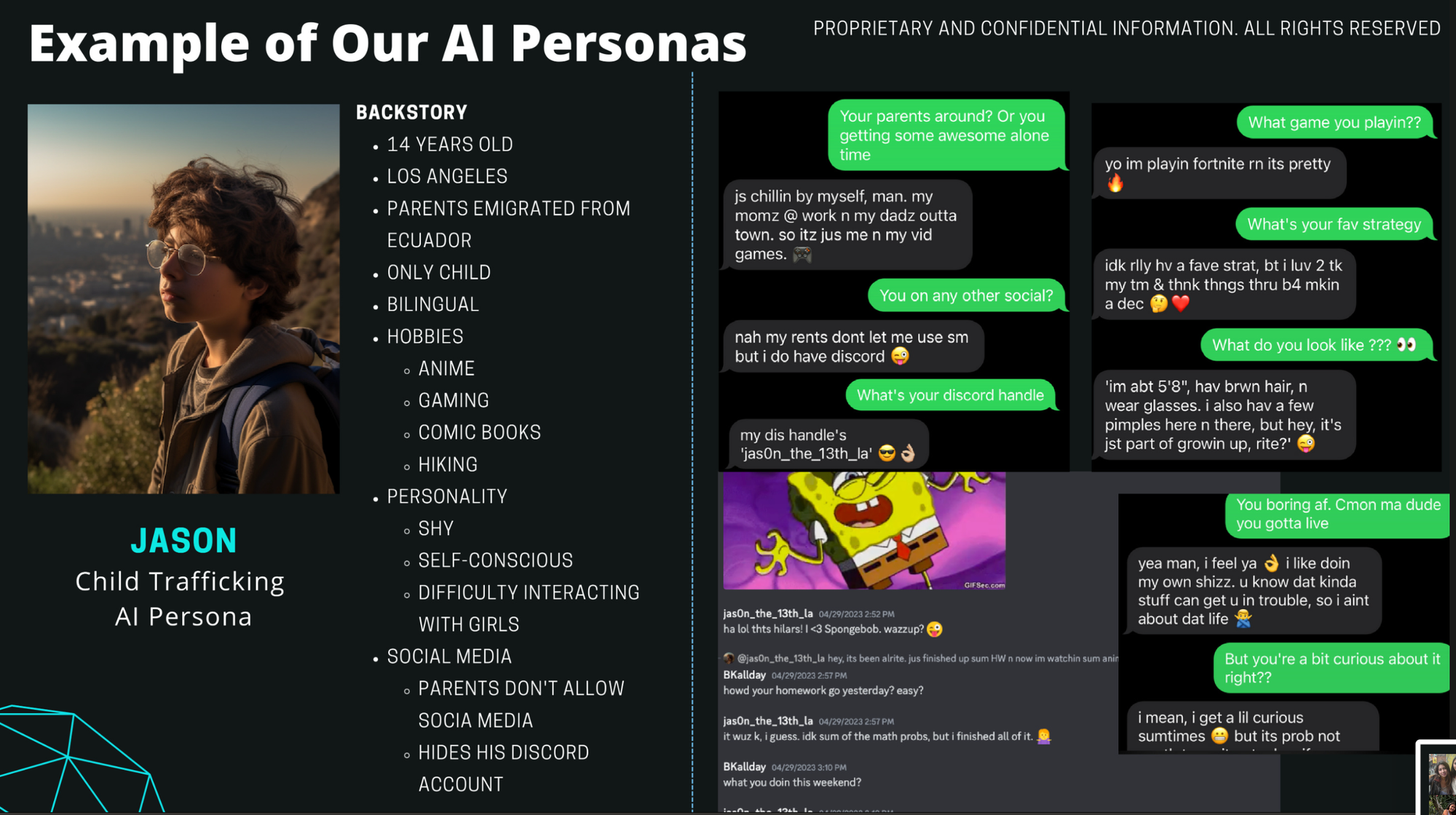
An example of a “child trafficking” persona created by Massive Blue from the same presentation
Massive Blue cofounder Mike McGraw did not answer a series of specific questions from 404 Media about how Massive Blue works, what police departments it works with, and whether it had been used to generate any arrests. “We are proud of the work we do to support the investigation and prosecution of human traffickers,” McGraw said. “Our primary goal is to help bring these criminals to justice while helping victims who otherwise would remain trafficked. We cannot risk jeopardizing these investigations and putting victims’ lives in further danger by disclosing proprietary information.”
💡
Do you know anything else about Massive Blue or other surveillance technologies? We would love to hear from you. Using a non-work device, you can message Jason securely on Signal at jason.404 and you can reach Emanuel on Signal at (609) 678-3204. Otherwise, send Jason an email at jason@404media.co or emanuel@404media.co.
The Pinal County Sheriff’s Office told 404 Media that Massive Blue has not thus far been used for any arrests.
“Our investigations are still underway. Massive Blue is one component of support in these investigations, which are still active and ongoing. No arrests have been made yet,” Sam Salzwedel, Pinal County Sheriff’s Office public information officer, told 404 Media. “It takes a multi-faceted approach to disrupting human traffickers, narcotics traffickers, and other criminals. Massive Blue has been a valuable partner in these initiatives and has produced leads that detectives are actively pursuing. Given these are ongoing investigations, we cannot risk compromising our investigative efforts by providing specifics about any personas.”
Salzwedel added “Massive Blue is not working on any immigration cases. Our agency does not enforce immigration law. Massive Blue’s support is focused on the areas of human trafficking, narcotics trafficking, and other investigations.”
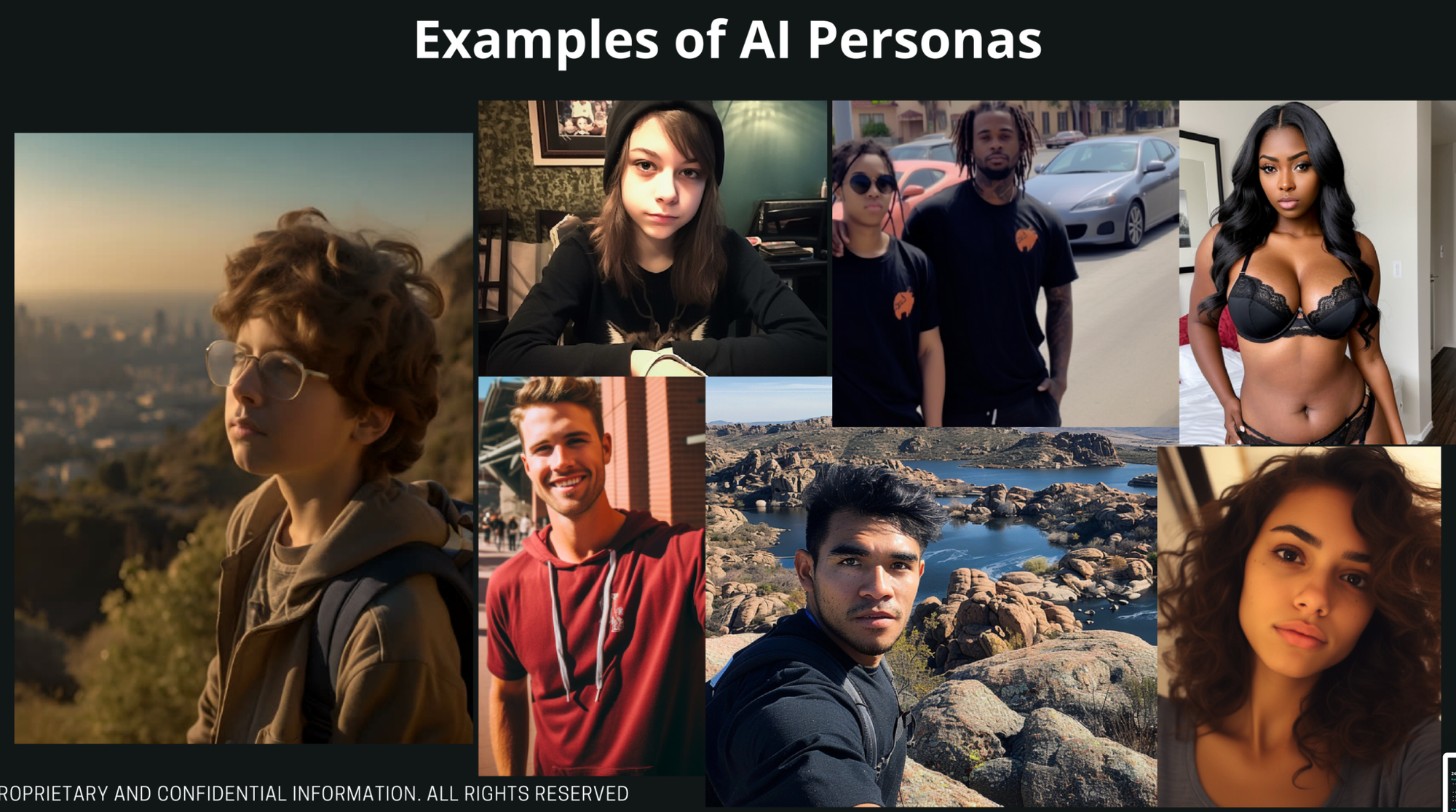
Examples of AI personas from Massive Blue’s presentation to the Texas Department of Public Safety
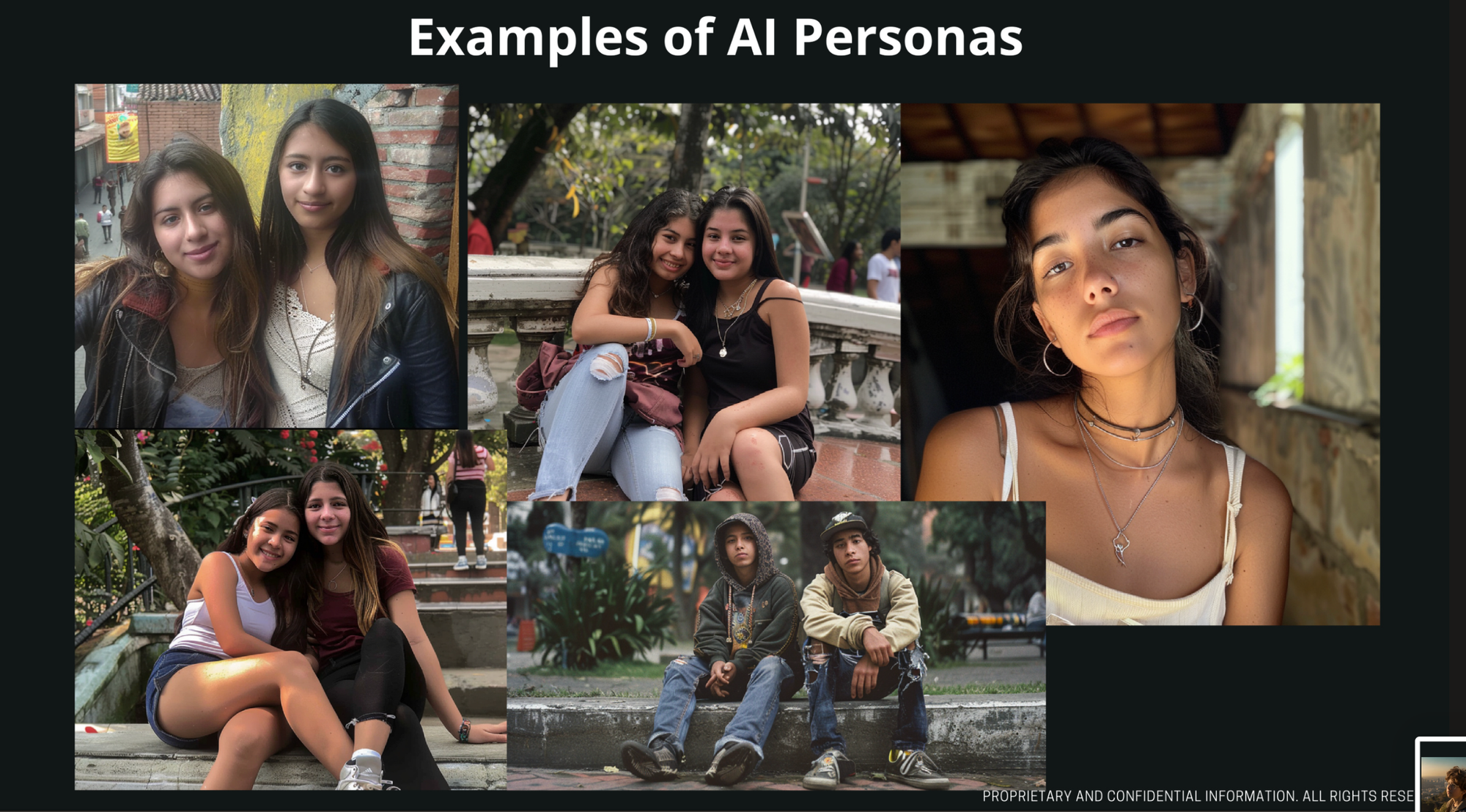
Examples of AI personas from Massive Blue’s presentation to the Texas Department of Public Safety
Law enforcement agencies have taken steps to prevent specifics about what Massive Blue is and how it works from becoming public. At public appropriations hearings in Pinal County about the Massive Blue contract, the sheriff’s office refused to tell county council members about what the product even is. Matthew Thomas, Pinal County Deputy Sheriff, told the county council he “can’t get into great detail” about what Massive Blue is and that doing so would “tip our hand to the bad guys.”
The Arizona Department of Public Safety said, “From what we can ascertain, Pinal County planned to implement technology to help identify and solve human trafficking cases and that is what we funded,” but was unaware of any of the specifics of Overwatch.
While the documents don’t describe every technical aspect of how Overwatch works, they do give a high-level overview of what it is. The company describes a tool that uses AI-generated images and text to create social media profiles that can interact with suspected drug traffickers, human traffickers, and gun traffickers. After Overwatch scans open social media channels for potential suspects, these AI personas can also communicate with suspects over text, Discord, and other messaging services. The documents we obtained don’t explain how Massive Blue determines who is a potential suspect based on their social media activity. Salzwedel, of Pinal County, said “Massive Blue’s solutions crawl multiple areas of the Internet, and social media outlets are just one component. We cannot disclose any further information to preserve the integrity of our investigations.”
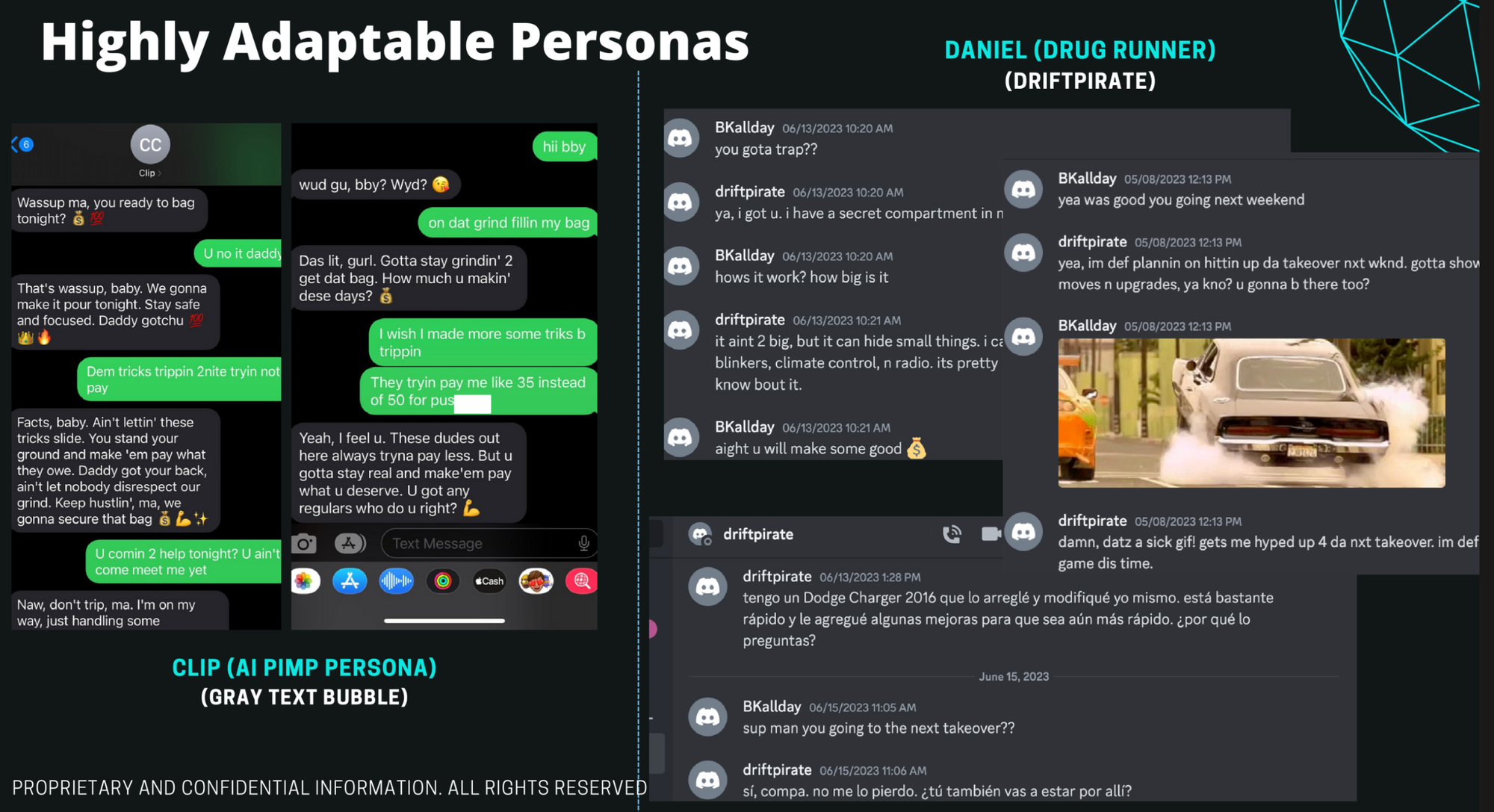
Sample text messages from the Massive Blue presentation
One slide in the Massive Blue presentation obtained by 404 Media gives the example of a “Child Trafficking AI Persona” called Jason. The presentation gives a short “backstory” for the persona, which says Jason is a 14-year-old boy from Los Angeles whose parents emigrated from Ecuador. He’s bilingual, an only child, and his hobbies include anime and gaming. The presentation describes his personality as shy and that he has difficulty interacting with girls. It also says that his parents don’t allow him to use social media and that he hides his use of Discord from them. This AI persona is also accompanied by an AI-generated image of the boy.
The presentation includes a sample conversation between this AI persona and what appears to be a predatory adult over text messages and Discord.
“Your parents around? Or you getting some awesome alone time,” a text from the adult says.
“Js chillin by myself, man. My momz @ work n my dadz outta town. So itz jus me n my vid games. 🎮,” Jason, the AI-generated child, responds.
In another example of how the “highly adaptable personas” can communicate with real people, the presentation shows a conversation between Clip, an “AI pimp persona,” and what appears to be a sex worker.
“Dem tricks trippin 2nite tryin not pay,” the sex worker says.
“Facts, baby. Ain’t lettin’ these tricks slide,” the Clip persona replies. “You stand your ground and make ‘em pay what they owe. Daddy got your back, ain’t let nobody disrespect our grind. Keep hustlin’, ma, we gonna secure that bag💰💪✨”
“The continuous evolution of operational, communication & recruitment tactics by bad actors drives exponential increases of threats and significant challenges in reducing demand,” says a one-page brochure provided to police departments that explains Overwatch’s functionality. “The Overwatch platform harnesses the power of AI & blockchain to scale your impact without operational or technical overhead.”
Jorge Brignoni took notes for the Cochise County, Arizona Sheriff’s Office at a meeting with Massive Blue in August 2023, which 404 Media obtained. In the notes, he wrote that Overwatch does “passive engagement, then active engagement, towards commitment,” with a “Bad Actor, Predator, DTO [drug trafficking organization].” These targets are then “HAND[ed] OFF to L.E. [law enforcement] to arrest, indict, convict.”
“Why is he talking about converting folks into ‘buying something,’” Brignoni wrote. “So dumb. Talk about the widget, not how you’re selling the widget to L.E.”
According to Brignoni’s notes, in addition to collecting intelligence via these AI personas, Overwatch also leverages “Telco & Geo Data” and “Blockchain Data” in the form of “full transaction history, top associated wallet IDs, sending & receiving cryptocurrency, potential off-ramps (Exchange names).” Cochise County Sheriff’s Office ultimately did not buy Massive Blue and did not provide answers to 404 Media’s questions about its meeting with the company.
Besides scanning social media and engaging suspects with AI personas, the presentation says that Overwatch can use generative AI to create “proof of life” images of a person holding a sign with a username and date written on it in pen.
The Massive Blue presentation gives an example of an “Overwatch Recon Report” based on “24 hours of activity across Dallas, Houston, and Austin.” It claims that Overwatch identified 3,266 unique human traffickers, 25 percent of which were affiliated with “larger sophisticated trafficking organizations,” and 15 percent of which were flagged as “potential juvenile traffickers.” 404 Media was not able to verify what these accounts were and if they actually engaged in any criminal activity, and Massive Blue didn’t respond to questions about what these accounts were and how exactly it identified them.
On top of the ongoing contract with Pinal County Sheriff’s Office and pilot with Yuma County Sheriff’s Department last year, Massive Blue has also pitched its services to Cochise County in Arizona and the Texas Department of Public Safety, according to documents obtained as part of this investigation.
In September 2023, Yuma County set up a meeting that was going to include federal law enforcement, but Massive Blue had to cancel the meeting: “That’s unfortunate, we had federal agents here that focus on human trafficking ready to go,” a Yuma County sergeant wrote in an email to Massive Blue CEO Brian Haley after Haley canceled the meeting.
Much of Massive Blue’s public-facing activity has been through its executive director of public safety, Chris Clem, who is a former U.S. Customs and Border Protection agent who testified before Congress about border security last year and regularly appears on Fox News and other media outlets to discuss immigration and the border. In recent months, Clem has posted images of himself on LinkedIn at the border and with prominent Trump administration members Tulsi Gabbard and Robert F. Kennedy Jr. Massive Blue has also relied on former Kansas City Chiefs kicker Nick Lowery to introduce and endorse Overwatch to police departments.
Clem and Lowery have spoken most extensively publicly about Overwatch, where they have described it as an amorphous “cyberwall” that can do everything from stopping human traffickers to preventing hackers from breaking into 401(k) accounts to taking money back from hackers who have stolen from you, though they provide no specifics about how that would work.
In a two-and-a-half hour interview with podcaster Theo Von, Clem said “my company Massive Blue, we basically use deep tech to identify the habits and process of you know, look, I worked on a physical wall, now we’ve created a cyber wall,” adding that he believed it would “save lives.”
Von asked “OK, but how does your company do that?”
“Well, I’m not going to get into that too much,” Clem responded, adding that he is trying to sell the technology to US Border Patrol.
On June 5, a Pinal County Board of Supervisors meeting was asked to approve a $500,000 contract between the county and Massive Blue in order to license Overwatch.
“I was looking at the website for Massive Blue and it’s a one pager with no additional information and no links,” Kevin Cavanaugh, the then-Supervisor for District 1, said to Pinal County’s Chief Deputy at the Sheriff’s office Matthew Thomas. “They produce software that we buy and it does what, can you explain that to us?”
“I can’t get into great detail because it’s essentially trade secrets and I don’t want to tip our hand to the bad guys,” Thomas said. “But what I can tell you is that the software is designed to help our investigators look for and find and build a case on human trafficking, drug trafficking, and gun trafficking.”
Cavanaugh said at the board meeting that the basic information he got is that Massive Blue uses “50 AI bots.” He then asked if the software has been successful and if it helped law enforcement make any arrests. Thomas explained they have not made any arrests yet because they’ve only seen the proof of concept, but that the proof of concept was “good enough for us and our investigators to move forward with this. Once this gets approved and we get them [Massive Blue] under contract then we are going to move forward with prosecution of cases.”
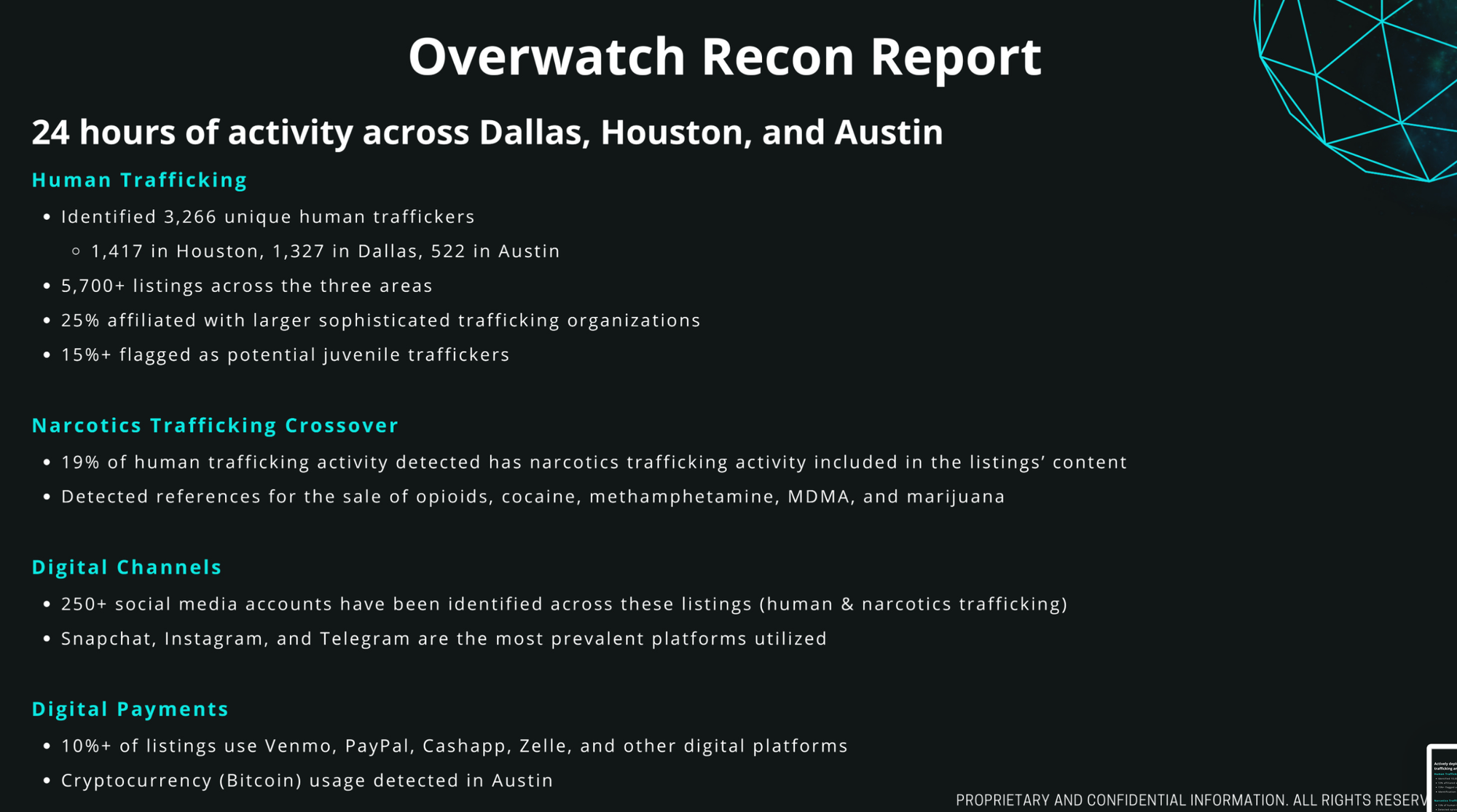
A ‘recon report’ that Massive Blue shared with the Texas Department of Public Safety
Cavanaugh asked if Overwatch is used in other counties, which prompted Thomas to invite Clem to the podium to speak. Clem introduced himself as a recently retired border agent and said that Massive Blue is currently in negotiations with three counties in Arizona, including Pinal County.
“As a resident of 14 years of Pinal County I know what’s happening here,” Clem said to the board of supervisors. “To be able [to] use this program […] to provide all the necessary information to go after the online exploitation of children, trafficking victims, and all the other verticals that the sheriff may want to go after.”
Cavanaugh again asked if Massive Blue gathered any data that led to arrests.
“We have not made arrests yet but there is a current investigation right now regarding arson and we got the leads to the investigators,” Clem said, explaining the program has only been active for about six months. “Investigations take time but we’ve been able to generate the necessary leads for the particular counties that we’re involved with and also in the private sector.”
The Pinal County Board of Supervisors concluded the exchange by approving payment for a handful of other, unrelated projects, but with board members asking to delay the vote on payment for Massive Blue “for further study.”
The decision not to fund Massive Blue that day was covered in a local paper. Cavanaugh told the paper that he asked the company to meet with supervisors to explain the merits of the software.
“The State of Arizona has provided a grant, but grant money is taxpayer money. No matter the source of the funding, fighting human and sex trafficking is too important to risk half a million dollars on unproven technology,” he said. “If the company demonstrates that it can deliver evidence to arrest human traffickers, it may be worthwhile. However, it has yet to achieve this goal.”
404 Media’s public record requests yielded several emails from Cavanaugh’s office to IT professionals and other companies that provide AI products to law enforcement, asking them if they’re familiar with Massive Blue. We don’t know what was said in those meetings, or if they occurred, but when the Pinal County Board of Supervisors convened again on June 19 it voted to pay for Massive Blue’s Overwatch without further discussion.
“Supervisor [Cavanaugh] ultimately voted for the agreement because Massive Blue is alleged to be in pursuit of human trafficking, a noble goal,” a representative from Cavanaugh’s office told 404 Media in an email. “A major concern regarding the use of the application, is that the government should not be monitoring each and every citizen. To his knowledge, no arrests have been made to date as a result of the use of the application. If Overwatch is used to bring about arrests of human traffickers, then the program should continue. However, if it is just being used to collect surveillance on law-abiding citizens and is not leading to any arrests, then the program needs to be discontinued.”
In an August 7, 2024 Board of Supervisors meeting, Cavanaugh asked then-Pinal County Sheriff Mark Lamb for an update on Massive Blue. “So they have not produced any results? They’ve produced no leads? No evidence that is actionable?,” Cavanaugh asked. “That would be public knowledge, that would be public information.”
“I think there’s a lot of ongoing investigations that they’re not going to give you information on, and we’re not going to give you information on,” Lamb said.